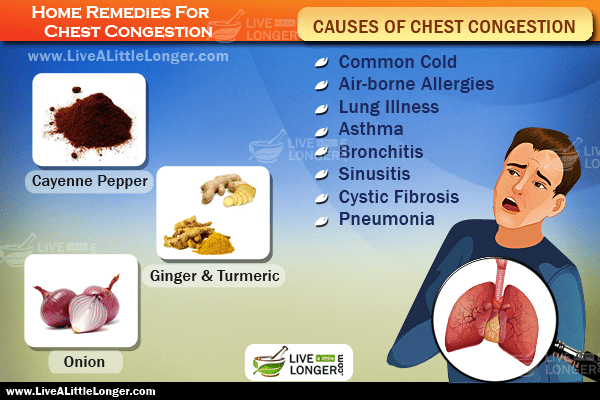
The feeling of something not being able to swallow can be best described as one of the symptoms of chest congestion. It happens when the membranes (mucous or mucosa) lining the airways (respiratory tract) are activated in full force due to the attack from a foreign invader such as virus, bacteria, or dust. The membranes are inflamed, irritated, and your body creates extra mucus to eliminate the unwanted guests. Imagine yourself coughing uncontrollably in a public space? Wouldn’t the scene be awkward? So, to help you out, here are some herbal and home remedies for chest congestion. Before we list them to you, we will know its causes and symptoms.
What Is Mucus And How It Helps You?
Mucus is a jelly-like substance (white-yellowish or green) that is produced within the body to allow the smooth passage of irritants and unwanted foreign particles from the air pipes. They protect the lining of the lungs, which are pipes that connect your nose and mouth. These areas are often vulnerable to irritants, which then have to be pushed outside through coughing, sneezing, or have to be pushed into the body, which can later be dealt with.
It is important for the air passage to remain free to avoid choking and causing difficulty in breathing. However, this yellowish white substance sometimes even green needs to stay in control so that you do not feel heavy in the chest. As the name describes, chest congestion is something where you feel that your chest is congested with the mucus.
Chest congestion leads to a feeling of being ill; sometimes you are not able to taste and swallow your food properly, and nothing seems to help at that moment. Too much mucus in the body leads to constant coughing and even a blocked nose or maybe sometimes even a runny nose. This is not something to be worried about, but it can spoil your day’s events, and if not treated at the right time, it can be a symptom of some other major disease.
Causes of Chest Congestion
- Viral Infections: Viral Infections that can cause a cough are everywhere. We simply cannot flee encountering them. However, while some of us have a strong immunity system, some might not have the power to fight against them. Viruses can enter the body through the air we breathe, the food we eat, or the water we drink. They are smaller than bacteria, fungus, or parasites.
- Common cold: Common cold when neglected can lead to chest congestion. The mucus is easily stored and can give you a feeling as if your chest is heavy. The common cold is usually caused when there is a drastic change in the climate. For example; during the beginning of the rainy season or when the winter is coming. This is the peak time when doctors get many patients complaining about the common cold and eventual chest congestion.
- Bronchitis: A severe form of the common cold can soon turn into bronchitis (if not paid attention). When the airways in your lungs are inflamed, they produce a lot of mucus. There are two types of bronchitis: acute and chronic. The causes and period for coughing in the two types vary. Acute bronchitis is usually resolved within two weeks, but chronic bronchitis, on the other hand, can only be controlled but not cured, as warned by many.
- Pneumonia: Chronic cold can be pneumonia. It sometimes may be difficult to differentiate whether it is just normal cold or pneumonia. It damages the tissue lining your air passage, and you may cough out mucus. Pneumonia victims face difficulty in breathing, as the tissue becomes inflamed making it difficult for the oxygen to reach your lungs. The difference between bronchitis and pneumonia is that bronchitis causes a swollen throat whereas pneumonia infection causes fluids in the lungs.
- Smoking: Smoking kills and everyone knows this. Smoking is a major cause of chronic bronchitis. If not anything, smoking does hamper treatment for chest congestion. Your lungs are already sick of inhaling the toxic air that goes in through those cigarettes and to add on to it; you would not want to carry the extra load of the extra mucus. The tar that is stored in the lungs due to cigarette smoking affects the lining of the lungs, which are furthermore damaged. Even a slight cough can be painful in such a scenario.
- Irritants and Pollution: The air is filled with pollutants that can be troublesome at times. Indoor air pollution, wood or oil fumes can also cause irritation in your nasal passage. Beause of it, so many hair problems experienced by men and loosing confidence in themselves. If you have been having difficulty to breathe for a prolonged period, then it may be COPD (Chronic Obstructive Pulmonary Disease) and needs special care.
- Allergy: If you are allergic to any particular thing, especially something that can be inhaled for example dust or pollen grains, then it may lead to chest congestion. Allergens can trigger a series of immune reactions that can widely affect your respiratory organs including your lungs and become a source of chest congestion.
Symptoms Of Chest Congestion
The symptoms are very difficult to distinguish from other ailments. Since the body does not get sufficient quantity of oxygen, you feel tired. Some of the common symptoms of chest congestion are chest pain and tightened chest. Coughing can be described as the most natural response of throat and lungs to eliminate the mucous deposited in the surrounding areas of the chest. In the mucous (or phlegm), you can find pollutants, pathogens, and allergens. A few of the common symptoms are listed below:
- Difficulty in breathing
- Drawing breaths in a loud noise
- Dizziness
- Constant coughing
- Loud noises while breathing (extreme snoring while sleeping)
- Wheezing
- Thick tongue
- Chest pain
- Discomfort
- Running nose
Note: Chest congestion sometimes can also be confused with other diseases like influenza or pneumonia. Chest congestion can be a symptom of some other disease or can be a disease in itself. The reason being that chest congestion can be a sign of future pneumonia or bronchitis. If difficulty in breathing is consistent for more than a week and too painful for your airways, then it is better to consult a doctor immediately and go through some tests.
12 Natural Home Remedies For Chest Congestion
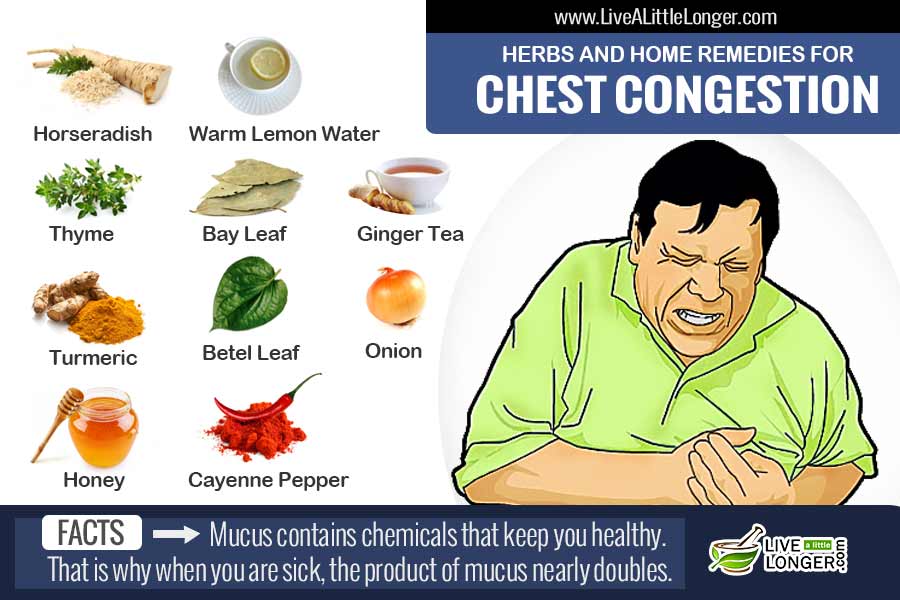
Note: Chest congestion may be the result of a minor infection, but if the person suffering from it has low immunity, then the condition can lead to bronchitis or pneumonia. So, make sure to give the treatment at the appropriate time. Normal chest congestion will be cured within 4 to 5 days. If the conditions prolong after a week, a visit to the physician is required.
12. Justicia Adhatoda + Solanum Trilobatum + Black Pepper
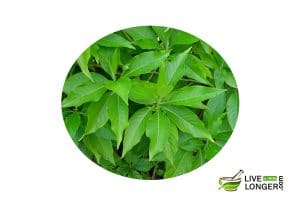 Justicia Adhotoda: It is also commonly known in the English language as Malabar nut or Adulsa. It is a medicinal plant as one can notice its mention in Siddha medicine, Ayurveda and Unani methods of medication. Adhatoda herb is well known to cure fever, cold, cough, diarrhea, and so on. This evergreen plant grows upto a height of two meters in tropical climates. The leaves are bitter tasting and oppositely arranged. The flowers of this plant are white in color. It can be found in Asian countries including India, Pakistan, China, Nepal, etc.
Justicia Adhotoda: It is also commonly known in the English language as Malabar nut or Adulsa. It is a medicinal plant as one can notice its mention in Siddha medicine, Ayurveda and Unani methods of medication. Adhatoda herb is well known to cure fever, cold, cough, diarrhea, and so on. This evergreen plant grows upto a height of two meters in tropical climates. The leaves are bitter tasting and oppositely arranged. The flowers of this plant are white in color. It can be found in Asian countries including India, Pakistan, China, Nepal, etc.
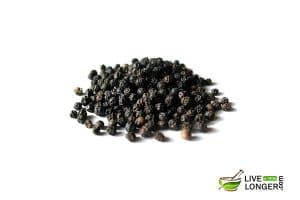 Black Pepper: More than a spice, it is a medicinal herb. In ancient times, Greeks used them as currency. Black, round and pungent seeds of black pepper are a strong answer to the tough mucus that is refusing to come out. Pepper is highly recommended as one of the home remedies for chest congestion (if it is due to cold or a cough). Indian moms use these dried seeds of black pepper to add a spicy tinge to it. It adds flavor as well as acts as a medicine. Its effect can be seen immediately. Apart from treating congestion problems, it aids in digestion, improves skin texture, heals depression, etc.
Black Pepper: More than a spice, it is a medicinal herb. In ancient times, Greeks used them as currency. Black, round and pungent seeds of black pepper are a strong answer to the tough mucus that is refusing to come out. Pepper is highly recommended as one of the home remedies for chest congestion (if it is due to cold or a cough). Indian moms use these dried seeds of black pepper to add a spicy tinge to it. It adds flavor as well as acts as a medicine. Its effect can be seen immediately. Apart from treating congestion problems, it aids in digestion, improves skin texture, heals depression, etc.
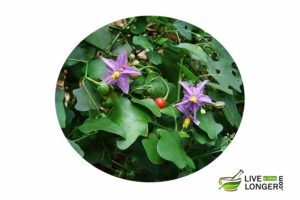 Solanum Trilobatum: This is a widely known thorny creeper herb. The flowers are bluish-purple, and the plant bears small sized fruits. The whole plant; its leaves, fruits, and flowers are known to have rich medicinal powers. It is also called as Thai nightshade or purple-fruited pea eggplant in the common language. The plant is full of thorns, and these thorns are believed to be mildly toxic, so you had better remove these thorns before using the leaves. You can even store these leaves for a longer period if you dry and churn them into a powder. But, store it in a moist free clean container. To try this remedy, follow the steps given below:
Solanum Trilobatum: This is a widely known thorny creeper herb. The flowers are bluish-purple, and the plant bears small sized fruits. The whole plant; its leaves, fruits, and flowers are known to have rich medicinal powers. It is also called as Thai nightshade or purple-fruited pea eggplant in the common language. The plant is full of thorns, and these thorns are believed to be mildly toxic, so you had better remove these thorns before using the leaves. You can even store these leaves for a longer period if you dry and churn them into a powder. But, store it in a moist free clean container. To try this remedy, follow the steps given below:
- Step 1: Take some Adathodha leaves and Solanum Trilobatum leaves.
- Step 2: Boil them in water. Add a few black pepper seeds to it. Boil them again
- Step 3: Filter and drink it weekly once to reduce the mucus.
How Does This Work?
This concoction is a perfect and one of the sure shot chest congestion remedies. The leaves of Adhatoda Vasica contain alkaloids, tannins, flavonoids that work effectively to treat chest congestion. Solanum Trilobatum on the other side is said to be a natural rejuvenator and has been used to treat respiratory diseases since ages. Experts also say that the plant possesses some antibacterial, antifungal, and antitumor properties. Black pepper adds some spicy flavor to the concoction and fastens the treatment process.
The Remedy Is Not Good If:
- You are pregnant or breastfeeding. It can cause miscarriage.
- You consume in high doses. It can cause diarrhea and vomiting.
- You are undergoing treatment for thyroid. It is better to avoid black pepper.
- You are allergic to any of these herbs or their compounds.
- You are continuing the remedy for a long time.
11. Cayenne Peppers
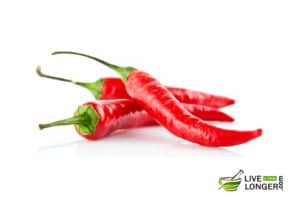 Cayenne pepper contains an active ingredient called capsaicin, which helps in reducing chest congestion. But don’t eat it raw. Cook and consume it with food. The other benefits of cayenne pepper are many. It helps in the treatment of inflammation, pain, headache, blood clots, etc. Hence, having chilies and jalapenos in the diet can reduce the discomfort caused by chest congestion since the mucus is loosened and the sinus area is cleared. To try a remedy with cayenne peppers and to help you relieve chest congestion, here is what you need to do:
Cayenne pepper contains an active ingredient called capsaicin, which helps in reducing chest congestion. But don’t eat it raw. Cook and consume it with food. The other benefits of cayenne pepper are many. It helps in the treatment of inflammation, pain, headache, blood clots, etc. Hence, having chilies and jalapenos in the diet can reduce the discomfort caused by chest congestion since the mucus is loosened and the sinus area is cleared. To try a remedy with cayenne peppers and to help you relieve chest congestion, here is what you need to do:
- Step 1: Take one teaspoon of cayenne pepper and warm water.
- Step 2: Immerse the cayenne pepper in water for ten minutes.
- Step 3: Take out the cayenne pepper and gargle with the water.
- Step 4: Continue this practice three times a day. Let the gargling duration be ten minutes.
Note: Spicy foods contain chili powder. However, cayenne pepper has natural chemical components to clear the blocked sinuses along with bronchial tubes.
How Does This Work?
Although cayenne pepper contains many medical ingredients, the main reason for reducing chest congestion is capsaicin. This medical component can break the mucus and eliminates the fluid from the lungs. The other benefits are strengthening of lung tissues.
Cayenne Pepper Is Not Good, If:
- You are taking medications such as ketoconazole (Nizoral- for treating fungal infections in the body), fexofenadine (Allegra – used for treating allergy symptoms such as runny nose, sneezing and watery eyes) and Lovastatin (Mevacor – it assists in controlling bad cholesterol by the liver – it aids in prevention of heart disease).
- Be careful while performing the process of gargling and avoid the water encountering the eyes. Some individuals can have side effects of irritation, coughing, and runny nose.
10. Turmeric
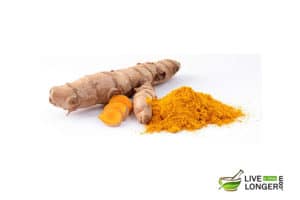 Turmeric might be one of the most effective and highly nutritional supplements in existence. In fact, many studies demonstrate that turmeric has major benefits not only for the body but also for the brain. Turmeric powder is easily available. The powder is best used for breathing problems such as blockage of nasal passages. It is used in ancient medicine for anti-viral actions and anti-bacterial purposes. Besides treating simple ailments, the Medical Center of Maryland University claims that the turmeric’s strong antioxidants can also help in fighting the free radicals that cause cancer. However, for natural chest congestion relief, use turmeric in the following way:
Turmeric might be one of the most effective and highly nutritional supplements in existence. In fact, many studies demonstrate that turmeric has major benefits not only for the body but also for the brain. Turmeric powder is easily available. The powder is best used for breathing problems such as blockage of nasal passages. It is used in ancient medicine for anti-viral actions and anti-bacterial purposes. Besides treating simple ailments, the Medical Center of Maryland University claims that the turmeric’s strong antioxidants can also help in fighting the free radicals that cause cancer. However, for natural chest congestion relief, use turmeric in the following way:
- Step 1: Take a glass of water and a teaspoon of organic turmeric powder.
- Step 2: Combine the mixture thoroughly.
- Step 3: After three minutes, consume the mixture.
- Step 4: Let the procedure be continued three times a day.
- Step 5: The chest will be cleared of mucus in one day or two days.
How Does This Work?
The main medical component of turmeric is because of the compound curcumin. The three different types of curcumin are desmethoxycurcumin, diferuloylmethane, and bisdemethoxycurcumin. The anti-inflammatory properties of curcumin relieve the individual of chest congestion.
Turmeric Is Not Good, If:
- Although turmeric is a natural resource, some persons might experience nausea, diarrhea or dizziness.
- You have a gall bladder problem. The situation might turn worse if you have a bile duct obstruction or gallstones.
- You have a bleeding disorder. Turmeric might slow down the clotting of blood. If you are scheduled for surgery, avoid consumption of turmeric before two weeks.
- You are diabetic. The blood sugar level will be reduced.
- You are suffering from gastroesophageal reflux disease (GERD). The symptoms are stomach upset and severe pain.
- You have a hormone-sensitive condition such as uterine cancer, breast cancer, ovarian cancer, uterine fibroids, and endometriosis. Turmeric acts similar to the estrogen hormone and makes conditions worse.
- You are planning for a baby. Men should exercise precaution in consumption of turmeric as it reduces the level of testosterone and movement of sperms.
- You have iron deficiency. Turmeric restricts the absorption of iron in the diet.
9. Ginger
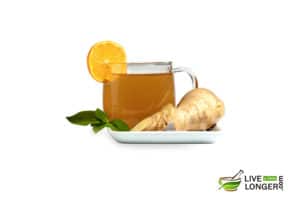 Ginger is one of the most delicious and healthiest spices. In fact, it is a common ingredient used in Indian and few other Asian cuisines. It has been traditionally used for preparing many medicines. It can heal many ailments like motion sickness, cold, cough, nausea, appetite loss, etc. Hence, chest congestion is no exception. The underground stems (rhizome) or roots of ginger plants can be consumed powdered, as a spice (dried form), oil, juice, or fresh. Ginger belongs to the family of Zingiberaceae. The main producers of Ginger are India, Fiji, Jamaica, Australia, and Jamaica. It is rich in bioactive compounds and other powerful nutrients to benefit your body as well as the brain. However, their roots have anti-inflammatory properties to reduce chest congestion. Apart from clearing the mucus, it improves body immunity too.
Ginger is one of the most delicious and healthiest spices. In fact, it is a common ingredient used in Indian and few other Asian cuisines. It has been traditionally used for preparing many medicines. It can heal many ailments like motion sickness, cold, cough, nausea, appetite loss, etc. Hence, chest congestion is no exception. The underground stems (rhizome) or roots of ginger plants can be consumed powdered, as a spice (dried form), oil, juice, or fresh. Ginger belongs to the family of Zingiberaceae. The main producers of Ginger are India, Fiji, Jamaica, Australia, and Jamaica. It is rich in bioactive compounds and other powerful nutrients to benefit your body as well as the brain. However, their roots have anti-inflammatory properties to reduce chest congestion. Apart from clearing the mucus, it improves body immunity too.
- Step 1: Take a ginger root and chop it into fine pieces. Add them to a cup of boiling water.
- Step 2: Cover the cup with a bowl and allow the mixture to get warm. Add honey (half tablespoon) to the mixture.
- Step 3: Consume the mixture three times every day until you get relief.
Note: The other mixture is grinding the pieces of one-tablespoon dry ginger, cloves, and black pepper together. Divide the powder into three doses and take the mixture three times a day with milk or honey.
How Does This Work?
Ginger contains chemical compounds known as polyphenol that inhibits the secretion of mucus.
Ginger Is Not Good, If:
- You have a bleeding disorder problem. Ginger also contains salicylates, which can act as a blood thinner. So, individuals with this disorder should not take ginger.
- You are taking medicines related to the heart such as aspirin, non-steroidal anti-inflammatory drugs (ibuprofen).
- You are breast-feeding a baby. Although no adverse situations have been reported so far, physicians have advised against the use of this root and to be on the safe side.
- You have low blood pressure. Result – you might suffer from lightheadedness (side effect).
Note: Avoid ginger if you suffer from an allergic reaction like – the closure of the throat, swelling of lips, face or tongue.
8. Lemons
 Lemons are one of the best home remedies for chest congestion. Health problems like colds, sinus infections, and allergies lead to clogged sinuses and a stuffy nose with mucus. In such cases, a hot lemon tea can be of great help. Drinking more fluids help in thinning of mucus and makes sure that the sinuses are unclogged. Also, the high quantities of vitamin C in lemons reduces the cold by 8% to 14%. So, whenever your chest feels congested, don’t forget to sip some healthy, warm lemon tea. To prepare one, follow the steps given below:
Lemons are one of the best home remedies for chest congestion. Health problems like colds, sinus infections, and allergies lead to clogged sinuses and a stuffy nose with mucus. In such cases, a hot lemon tea can be of great help. Drinking more fluids help in thinning of mucus and makes sure that the sinuses are unclogged. Also, the high quantities of vitamin C in lemons reduces the cold by 8% to 14%. So, whenever your chest feels congested, don’t forget to sip some healthy, warm lemon tea. To prepare one, follow the steps given below:
- Step 1: Take a lemon and cut it in half.
- Step 2: Make a cup of warm water. Squeeze half the lemon. Mix the lemon and water.
- Step 3: Add a teaspoon of honey and consume the mixture daily as many times as possible.
How Does This Work?
The juice of a lemon can be effectively used to treat chest congestion. The component is citric acid as it can reduce the thickness of mucus and gets it eliminated. The Vitamin C also enhances the body’s immunity.
Lemon Is Not Good, If:
- You are suffering from gastro-esophageal reflux disorder. The symptoms will be nausea, heartburn, and vomiting. If you are suffering from ulcer, acidic content in the stomach may damage the lining of the stomach, and the situation can be worsened.
- You are pregnant or breast-feeding a baby. It is safe if you use as part of the regular diet. However, doctors advise against the use of lemon juice or supplements in large amounts.
7. Horseradish
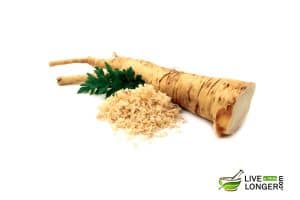 Horseradish (scientific name: Cochlearia Armoracia) can be effectively used for chest congestion, bronchitis, cold, and allergies. Believe it or not, horseradish is highly helpful in clearing the mucus and sinus infections from the respiratory passages. Whether you are consuming horseradish as an herbal remedy or using it with your favorite dish, its natural antibiotics clear the sinuses, remove excess mucus from the upper respiratory tracts, and increase facial circulation. This perennial plant belongs to the family of Brassicaceae (also includes wasabi, mustard, cabbage, and broccoli). To treat your chest congestion using horseradish, follow the steps given below:
Horseradish (scientific name: Cochlearia Armoracia) can be effectively used for chest congestion, bronchitis, cold, and allergies. Believe it or not, horseradish is highly helpful in clearing the mucus and sinus infections from the respiratory passages. Whether you are consuming horseradish as an herbal remedy or using it with your favorite dish, its natural antibiotics clear the sinuses, remove excess mucus from the upper respiratory tracts, and increase facial circulation. This perennial plant belongs to the family of Brassicaceae (also includes wasabi, mustard, cabbage, and broccoli). To treat your chest congestion using horseradish, follow the steps given below:
- Step 1: Take a fresh radish and wash the vegetable.
- Step 2: Chop it finely. You can put the pieces in a blender.
- Step 3: Drink the juice daily.
- Step 4: You can also apply the oil on the chest to reduce the mucus.
How Does This Work?
It can be used as an expectorant. The component, glucosinolates responsible for the characteristic taste of horseradish, acts as an antioxidant against simple infections such as chest congestions.
Horseradish Is Not Good, If:
- You have a problem with the thyroid gland. Other side effects include blood vomiting, diarrhea, and upset stomach.
- You are administering it to a child less than four years. The child can suffer from digestion problems.
6. Vinegar
 Whether the congestion is in the chest, throat or nose, vinegar is one of the best ways to get rid of them. Everybody knows that vinegar assists in eliminating the bacteria that cause harmful reactions in the chest. Yes, it tastes awful but is highly effective. The use of vinegar dates back to 10,000 years. Vinegar is prepared by fermenting the natural sugars of alcohol. Today, vinegar comes in different types. To name a few, you have balsamic, rice wine, rice, pineapple, raspberry, apple, etc. Vinegar is a rich source of beta-carotene, magnesium, iron, calcium, copper, potassium, proto-vitamin, vitamin C, vitamin E, vitamin A, vitamin B1, vitamin B2, and vitamin B6.
Whether the congestion is in the chest, throat or nose, vinegar is one of the best ways to get rid of them. Everybody knows that vinegar assists in eliminating the bacteria that cause harmful reactions in the chest. Yes, it tastes awful but is highly effective. The use of vinegar dates back to 10,000 years. Vinegar is prepared by fermenting the natural sugars of alcohol. Today, vinegar comes in different types. To name a few, you have balsamic, rice wine, rice, pineapple, raspberry, apple, etc. Vinegar is a rich source of beta-carotene, magnesium, iron, calcium, copper, potassium, proto-vitamin, vitamin C, vitamin E, vitamin A, vitamin B1, vitamin B2, and vitamin B6.
- Step 1: Add three teaspoons of vinegar (raw and unfiltered) to cups of warm water.
- Step 2: You can also add raw honey.
- Step 3: Drink the solution two or three times a week every day.
How Does This Work?
By the consumption of apple cider vinegar, the mucus in the chest is thinned and makes you breathe easily. It also promotes the entire immunity of the body. Since the fermentation process is long, the bioactive components such as gallic acid, acetic acid, caffeic acid, epicatechin have antimicrobial, antioxidant and other properties. There are also polyphenols such as chlorogenic acid that can prevent cardiovascular diseases.
Vinegar Is Not Good, If:
- You have a tooth problem. The acetic acid in vinegar can erode the enamel if used to gargle or to have a drink.
- You have sensitive skin. In the case of topical application, you can mix with honey, water, juice or a pinch of baking soda.
- You are over consuming it. The stomach will get upset.
5. Onions
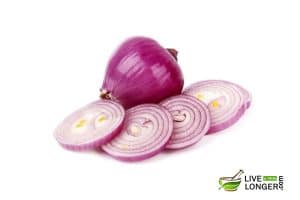 Onions have antibacterial and antiseptic properties to assist in fending off any infection. Hence, it is one of the best natural remedies for chest congestion. If you happen to have a mild sinus infection, just inhaling the scents of an onion (freshly chopped) may clear the nasal passages. But, their natural sulfur content can cause a burning and painful sensation in the eyes. If you don’t want this to happen, just slice a thin piece of onion and put it in a container of hot water. Let the onion boil for 5 minutes, ladle a little in a clean mug, and then inhale the aroma to relieve a runny or stuffy nose. However, there is another way too; here are the instructions:
Onions have antibacterial and antiseptic properties to assist in fending off any infection. Hence, it is one of the best natural remedies for chest congestion. If you happen to have a mild sinus infection, just inhaling the scents of an onion (freshly chopped) may clear the nasal passages. But, their natural sulfur content can cause a burning and painful sensation in the eyes. If you don’t want this to happen, just slice a thin piece of onion and put it in a container of hot water. Let the onion boil for 5 minutes, ladle a little in a clean mug, and then inhale the aroma to relieve a runny or stuffy nose. However, there is another way too; here are the instructions:
- Step 1: Cut an onion into small pieces and extract juice from them. The other ingredients to be used are equal proportions of honey, lemon juice, and water.
- Step 2: Combine all the proportions to make a mixture.
- Step 3: Heat the mixture and make it warm. You can have the mixture every day for relief.
How Does This Work?
Since onion contains organosulfur compounds (strong smell), they possess sulfur and quercetin. These two compounds possess the ability to break down the mucus and relieve the chest of mucus. Honey contains natural ingredients that can increase the immunity of a person. Lemon juice contains citric acid known for regulating the acid balance of the body.
Onions Are Not Good For, If:
- You have a gastric influx disease problem. Do not follow the procedure if you have faced Heartburn before, while feeding on onions.
- You are on blood-thinning drugs, as onion contains major components of Vitamin K. It can interfere with blood-thinning drugs. The side effects will be similar to honey.
- Persons allergic to onions can have feelings of vomiting, nausea and gastric discomfort (similar side effects in honey and lemon juice).
4. Thyme
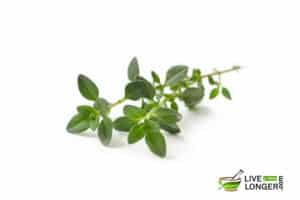 The next time you suffer from a cough, cold, congestion, or a sore throat, make sure to sip some natural thyme tea. This herb is extremely good for upper respiratory problems, even including whooping cough and bronchitis. It has antibacterial, analgesic, antiviral, antioxidant, anticancer, antitussive, and expectorant properties. For medicinal use, thyme leaves are used. Once they are harvested, thyme is sun-dried, and their leaves are beaten off their branches. As a herb, thyme promotes immunity of the body and chest to fight against bacteria. To treat chest congestion using thyme, follow the steps given below:
The next time you suffer from a cough, cold, congestion, or a sore throat, make sure to sip some natural thyme tea. This herb is extremely good for upper respiratory problems, even including whooping cough and bronchitis. It has antibacterial, analgesic, antiviral, antioxidant, anticancer, antitussive, and expectorant properties. For medicinal use, thyme leaves are used. Once they are harvested, thyme is sun-dried, and their leaves are beaten off their branches. As a herb, thyme promotes immunity of the body and chest to fight against bacteria. To treat chest congestion using thyme, follow the steps given below:
- Step 1: You can take one-half teaspoon of thyme.
- Step 2: On the other hand, make a cup of boiling water.
- Step 3: Allow the thyme for 20 minutes to become warm.
- Step 4: You can add a little honey to the mixture to make it sweet.
How Does This Work?
The volatile components in thyme (oil) are thymol, geraniol, borneol and also contain flavonoids such as naringenin, apigenin, luteolin, and thymonin. These increase the antioxidant capacity of the herb and give a high number on the immunity enhancing herb list for thyme.
Thyme Is Not Good, If:
- You are allergic to Lamiaceae species or oregano.
- You suffer from bleeding disorders. It might enhance the risk of bleeding if used in large amounts.
3. Bay Leaf
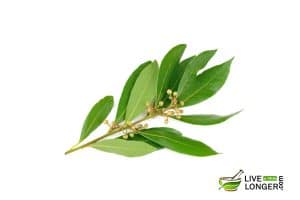 The use of bay leaves dates back to ancient times when Greeks and Romans used them for making crowns (for crowning kings, Olympians, and war heroes). Scientifically known as, Laurus Nobil, Bay leaves are one of the natural herbs that can help in the treatment of chest congestion. It has immense benefits and medicinal properties to treat simple ailments like cold, cough, stomach ache, liver, and kidney problems. Though it is native to the Asia Minor, you can find this tree even in the Mediterranean regions. They grow in warm climates with a maximum height of 12 meters. However, the rate of growth is too slow. A matured bay leaf is about 10 cm in length and 5 cm in width.
The use of bay leaves dates back to ancient times when Greeks and Romans used them for making crowns (for crowning kings, Olympians, and war heroes). Scientifically known as, Laurus Nobil, Bay leaves are one of the natural herbs that can help in the treatment of chest congestion. It has immense benefits and medicinal properties to treat simple ailments like cold, cough, stomach ache, liver, and kidney problems. Though it is native to the Asia Minor, you can find this tree even in the Mediterranean regions. They grow in warm climates with a maximum height of 12 meters. However, the rate of growth is too slow. A matured bay leaf is about 10 cm in length and 5 cm in width.
- Step 1: Take five fresh bay leaves.
- Step 2: Boil them in a cup of water.
- Step 3: Allow the leaves to soak in the mixture and then strain the tea.
- Step 4: Strain the tea.
- Step 5: Dip a white cloth in the water and then wring it. The cloth has to be applied to the chest to clear the mucus.
How Does This Work?
There are many oils such as myrcene, linalool, eugenol, chavicol, geranyl acetate, etc. These compounds are all believed to have digestive, anti-oxidant and antiseptic properties. There are also other compounds such as caffeic acid, rutin, salicylates, and phytonutrients, which are known to enhance the better functioning of the heart.
Bay Leaves Are Not Good, If:
- You are taking medications for blood sugar.
- You are diabetic. It can interfere with the blood sugar levels.
- You have undergone surgery recently or going to have one.
2. Betel Leaves
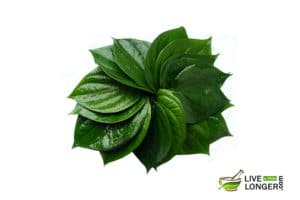 Betel leaves are used to aid digestion, and that is why in India, men and women both chew on betel leaves after their meals or sometimes even to pass the time. Betel leaves when mixed with certain spices and condiments for some, may even turn into an addiction. They are native to India, Sri Lanka, and Malaysia but can also be seen in Madagascar and Africa. It is claimed that this herb was used in the Harappan Civilization and how far is this true, is still unknown. To try a remedy using betel leaves, follow the steps given below:
Betel leaves are used to aid digestion, and that is why in India, men and women both chew on betel leaves after their meals or sometimes even to pass the time. Betel leaves when mixed with certain spices and condiments for some, may even turn into an addiction. They are native to India, Sri Lanka, and Malaysia but can also be seen in Madagascar and Africa. It is claimed that this herb was used in the Harappan Civilization and how far is this true, is still unknown. To try a remedy using betel leaves, follow the steps given below:
- Step 1: Take five fresh betel leaves.
- Step 2: Clean and boil them with 2 to 3 cups of water.
- Step 3: Drink this mixture 2-3 times a day to keep the body warm and healthy
How Does This Work?
The leaves contain amino and aspartic acid, which warms the body and thus helps, treat chest congestion. Betel Leaves are bitter to taste in its original form and so in case you are not able to drink it; you may add honey.
Betel Leaves Are Not Good, If:
- You are suffering from stomach ulcers, migraines, tuberculosis, acidity or epilepsy; it is good to avoid this remedy.
- People who are addicted to chewing betel leaves must be aware of oral cancer.
- You are using old betel leaves. Use only fresh Betel leaves which have medicinal properties.
1. Gymnema Sylvestre Leaves and Honey
Gymnema Sylvestre: Gymnema Sylvestre is a woody shrub, which is native to Africa and India. The leaves of this plant are used for making medicines. It is a bitter-tasting plant, which is also known as a miracle fruit. It has high medicinal properties and is the native fruit of the tropical forests in India and Sri Lanka. The entire plant can also be used, both its leaves and roots are consumable and good, as medicines. It is known to treat asthma, bronchitis, metabolic syndrome, diabetes, cough, weight loss, and is super effective for malaria. Also, it used as an antidote for snake bites.
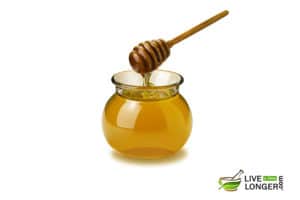 Honey: This is nature’s wonder not just because it tastes good but also because of its super medicinal powers. Honey has been mentioned since ancient times in all kinds of medicinal procedures including Ayurveda, Unani and even today it is used in allopathic medicine. Honey provides an excellent base to prepare cough syrup and that too without any side effects. Honey if preserved well can last for more than a thousand years. To try a remedy using these two amazing ingredients, follow the steps given below:
Honey: This is nature’s wonder not just because it tastes good but also because of its super medicinal powers. Honey has been mentioned since ancient times in all kinds of medicinal procedures including Ayurveda, Unani and even today it is used in allopathic medicine. Honey provides an excellent base to prepare cough syrup and that too without any side effects. Honey if preserved well can last for more than a thousand years. To try a remedy using these two amazing ingredients, follow the steps given below:
- Step 1: Make a fresh juice of Gymnema Sylvestre leaves (1/2 or 1 glass).
- Step 2: Add a few drops of organic honey to it, as per your taste.
- Step 3: Drink the mixture. Repeat on alternate days for a week to relive chest congestion.
How Does This Work?
The leaves contain Alkaloids, Amino Acids, and Carbohydrates. It also contains various acids like Butyric Acid, Formic Acid, and Tartaric Acid. These elements help treat chest congestion.
Honey is a mixture of sugar and other compounds. It is rich in carbohydrates, mainly fructose, sucrose, and glucose. It also had tartaric acid, formic acid, and butyric acid. Honey makes this juice drinkable, which would otherwise be bitter.
The Remedy Is Not Good, If:
- You are pregnant or breastfeeding.
- You consume on an empty stomach. It may cause gastrointestinal disorders.
- You are allergic to pollen grains. Avoid consuming honey.
- You are using adulterated honey. It is easily available in the market, and one should be careful of them.
How To Prevent Chest Congestion?
These preventive measures go a long way, and we all know that you can be better safe than sorry.
- Stay Hydrated: Drink lots of water and have a bath twice in a day to keep your airways moist. You may use hot water if you fear that you might catch a cold.
- Inhale Steam: Slight irritation in the throat can also be an indication of future chest congestion, for this, you can inhale steam with a mist vaporizer to loosen the dried mucus. A bowl of hot soup can also give you some congestion relief.
- Modifications in the Lifestyle: If you are affected by cold or flu, it is vital that you have to have a diet rich in vegetables and fruits. The immune system will get a boost, and the harmful pathogens can hardly get into the respiratory system. Dehydration should be avoided at all costs.
- Avoid Cough Suppressants: If you are affected with a minor cough, refrain from taking a cough suppressant. If a cough is suppressed, the body will be unable to expel the mucus, and then the result will be congestion. Opt for an expectorant as you can get a productive cough.
- Keep Away From Toxic Chemicals: If you are allergic to some plants and have asthma, it is better to avoid similar kind of places. Also to be included are toxic chemicals that can make the body produce mucus. The best way will be to perform consistently any exercise that can strengthen the breathing muscles and promote immunity. However, if you are one with heart problems or undergone surgery, a kind request from our side to seek the guidance of your personal doctor.
When To See A Doctor?
- In the case of a chronic cough, you need to go to a doctor.
- If you are consistently coughing for a week or more, then you should test your mucus for a Tuberculosis test. The right reason for a large amount of mucus to be generated needs to be analyzed before reaching any conclusions.
- Since there are many factors that can lead to chest congestion, it is important to conduct certain tests at a hospital if the home remedies for chest congestion mentioned above fail to work.
Natural Remedy vs. Pharmacy
Guaifenesin, CurcuminX4000™, Mucinex 600 and Vicks Vapo Rub are some of the over-the-counter medicines prescribed for chest congestion.

